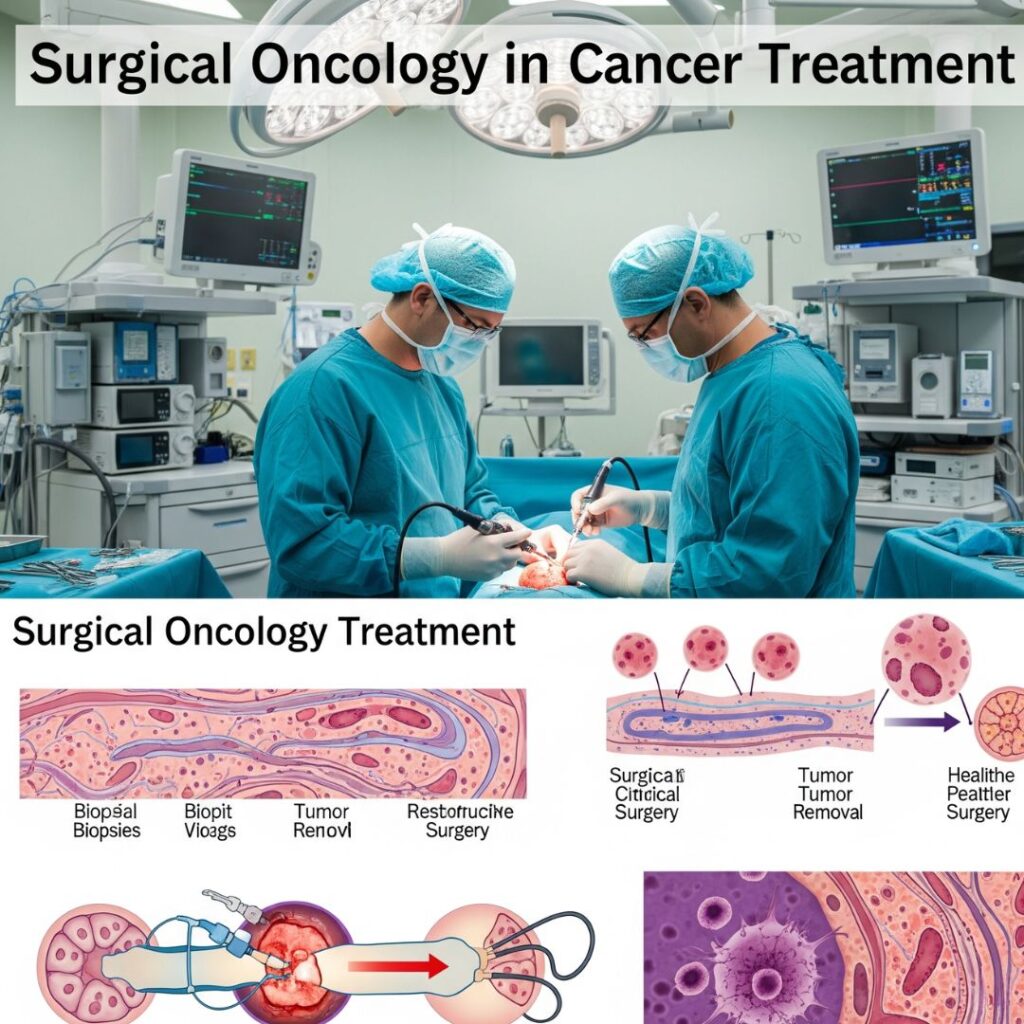Understanding the Role of Surgical Oncology
Cancer remains one of the top health concerns globally, but advancements in surgical methods have dramatically improved patient outcomes. Among the various treatment options, surgical oncology plays a crucial role in cancer management and cure.

Surgical oncology focuses on removing tumors, halting the spread of cancer, and enhancing survival rates. From diagnostic biopsies to complex organ removals, surgery often provides the most direct route to controlling and treating cancer.
This article explains the absolute benefits of surgical oncology and why surgical treatment is essential in the fight against cancer.
What Is Surgical Oncology?
Surgical oncology is a medical specialty that involves:
- Diagnosing cancer through biopsies
- Surgically removing tumors or cancerous masses
- Staging cancer accurately
- Managing symptoms in advanced stages (palliative care)
- Reconstructive procedures post-tumor removal
Surgical oncologists are specialists who coordinate with medical oncologists and radiologists to provide comprehensive cancer care.
One such expert is Dr. Kanuj Malik, a surgical oncologist with 14 years of experience. He completed his MBBS and MS in General Surgery from Maulana Azad Medical College & Lok Nayak Hospital, followed by an MCh in Surgical Oncology at the Cancer Institute (WIA) in Adyar, Chennai. Dr. Malik specializes in Head and Neck Cancer Treatment, Breast Cancer Treatment, Minimally Invasive Gynecological and Gastrointestinal Cancer Surgeries, Genitourinary Cancer Surgeries, and Musculoskeletal Cancer Surgeries. He is a member of several medical associations and has received multiple awards for his contributions to oncology research.
The Absolute Benefits of Surgical Oncology
1. Potential for Complete Cancer Removal
In early-stage cancers, surgery may provide a complete cure by removing the tumor before it spreads. This is especially true for:
- Breast cancer (lumpectomy or mastectomy)
- Colorectal cancer (colectomy)
- Lung cancer (lobectomy or pneumonectomy)
- Kidney cancer (nephrectomy)
- Liver tumors – Learn about liver cancer surgery options in India
Surgery is often the primary treatment for localized tumors, as confirmed by the American Cancer Society.
2. Accurate Diagnosis and Cancer Staging
For proper treatment planning, surgeons often need to determine the cancer’s exact stage. Surgical procedures such as biopsies and lymph node dissections help oncologists:
- Confirm the cancer type
- Understand how far it has spread
- Plan the most effective treatment strategy
This helps reduce unnecessary treatments and guides decisions for additional therapies like radiation or chemotherapy.
3. Relief of Cancer Symptoms (Palliative Surgery)
Surgery is not always about curing cancer. In advanced cases, palliative surgery helps manage symptoms and improve life quality by:
- Removing tumors that block organs
- Controlling bleeding
- Alleviating pain caused by tumor pressure
According to the National Cancer Institute, palliative surgeries play a crucial role in maintaining dignity and comfort during cancer care.
4. Supporting Multimodal Cancer Care
Surgical oncology often works hand-in-hand with other treatments such as:
- Chemotherapy
- Radiation therapy
- Immunotherapy
This combined treatment approach is often recommended by experts like the National Institutes of Health (NIH), as it improves survival rates and reduces cancer recurrence.
5. Minimally Invasive Surgery: Faster Recovery, Less Pain
Modern techniques such as robotic-assisted and laparoscopic cancer surgeries offer:
- Smaller incisions
- Less postoperative pain
- Shorter hospital stays
- Quicker recovery times
Learn more about advanced procedures like robotic cancer surgery in India, which make surgeries safer and more efficient.
Common Cancer Surgeries in Surgical Oncology
| Cancer Type | Surgical Procedure |
| Breast Cancer | Lumpectomy, Mastectomy (Breast Cancer Specialist in Noida) |
| Colorectal Cancer | Colectomy |
| Lung Cancer | Lobectomy, Pneumonectomy |
| Stomach Cancer | Gastrectomy |
| Prostate Cancer | Prostatectomy |
| Uterine Cancer | Hysterectomy for Uterus Cancer |
| Pancreatic Cancer | Whipple Procedure |
| Skin Cancer | Mohs Surgery, Excision |
What to Expect: Before, During, and After Surgery
Before Surgery: Consultation and Preparation
- Consult with a surgical oncologist – If you are in Noida, consider booking a consultation.
- Undergo diagnostic tests (scans, blood tests, biopsies)
- Make lifestyle adjustments for optimal recovery, such as improving nutrition and quitting smoking
During Surgery: The Process
- The procedure usually involves general anesthesia
- May be performed through open surgery, laparoscopic techniques, or robotic assistance
- Tumor removal is performed with the aim of preserving as much healthy tissue as possible
After Surgery: Recovery and Rehabilitation
- Pain management and wound care
- Physical therapy or rehabilitation, depending on the procedure
- Regular follow-ups to monitor for recurrence
- Additional treatments if recommended, such as chemotherapy or targeted therapies
For detailed guidance on recovery, you can explore this breast cancer surgery recovery guide.
Advancements in Surgical Oncology
Today, surgical oncology includes:
- Robotic and minimally invasive surgeries
- Enhanced imaging techniques for precision
- Integration with immunotherapy and targeted drugs
These advancements lead to better survival rates, reduced complications, and faster patient recovery.
For more on innovative treatments, check out Cancer Research UK’s guide to cancer surgery advancements.
Emotional and Physical Support During Recovery
Cancer surgery affects both body and mind. Patients benefit from:
- Family and caregiver support
- Counseling services for emotional well-being
- Nutrition and fitness guidance
- Postoperative rehabilitation programs
Conclusion: Why Surgical Oncology Is Indispensable
The absolute benefit of surgical oncology lies in its ability to:
- Completely remove cancer when localized
- Provide accurate staging and diagnosis
- Relieve symptoms in advanced cases
- Enhance survival rates through combination therapies
- Minimize recovery time with modern techniques
If you are looking for expert cancer surgery care, consult a specialized cancer surgeon in India for personalized guidance and treatment.
